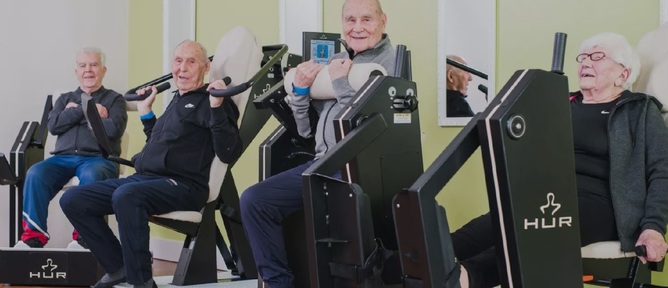Resistance training can 'reduce and reverse' elderly's frailty says academic
The strength of older people can be boosted by resistance training which can “reduce and reverse” their frailty, an academic at University of Stirling has found.

A study by the Scottish university has led academics to conclude that resistance training could help to tackle the negative outcomes linked to people's frailty, including disability and death.
Academics found improvements in the physical strength and function of 11 frail care home residents aged 65+, after they were given a six-week programme to do resistance training on specialised exercise machines for 30-40 minutes, three times a week.
Rise in walking speed
Researchers discovered participants in the resistance training experienced a large improvement in frailty and moved from 'frail' to 'pre-frail' status with a rise of 0.24 metres per second in their walking speed.
Professor Anna Whittaker, who led the study, said: “Prior to our study, the effect of resistance training on multidimensional health in frail older adults was unclear."
Having studied the care home residents over a six-month period, Professor Whittaker said: “We observed major improvements in frailty and physical function – such as walking speed, functional capacity and physical confidence – in the group of frail older adults who participated in resistance training.
“For the first time, our research underlines the importance of exercise – particularly resistance training – in later life and its role in helping to reduce and reverse frailty.
"This is especially important when you consider the adverse health outcomes – such as disability and mortality – associated with frailty.”
The small study was focused on residents living at Olivet Christadelphian Care Home in Birmingham. Smart-activated Hur exercise machines started the participants at near zero resistance before increasing it in small increments in line with their progress, unlike standard exercise machines.
In the first study of its kind in the UK to use the fitness equipment with older people, the six-week machine-based resistance training programme was found to have benefitted participants, compared to a control group.
Also gave elderly 'a sense of purpose'
Professor Whittaker added: “In addition to the health benefits identified, feedback from participants indicated that the training was enjoyable, improved social interaction, and provided a sense of achievement and purpose.”
The study 'A randomized controlled feasibility trial evaluating a resistance training intervention with frail older adults in residential care: The keeping active in residential elderly trial' was published in the Journal of Aging and Physical Activity. The research was funded through the European Commission’s Horizon 2020 and a University of Stirling PhD studentship.
Latest News
 29-Jul-24
Dementia Bus gives carehome.co.uk staff insight into life with dementia
29-Jul-24
Dementia Bus gives carehome.co.uk staff insight into life with dementia
 27-Jul-23
UK's top home care agencies in 2023 revealed
27-Jul-23
UK's top home care agencies in 2023 revealed
 30-Nov-22
A quarter of older people keep their falls secret from family
30-Nov-22
A quarter of older people keep their falls secret from family
 29-Nov-22
'Covid-19 has not gone away' say terminally ill
29-Nov-22
'Covid-19 has not gone away' say terminally ill
 28-Nov-22
IT consultant who received poor care opens 'compassionate' home care business
28-Nov-22
IT consultant who received poor care opens 'compassionate' home care business